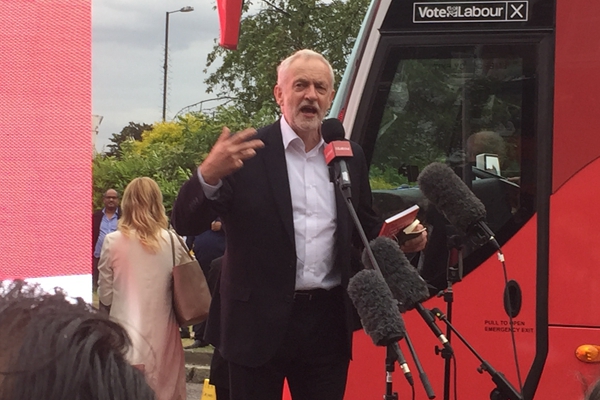British government in chaos as Corbyn mobilizes youth
- By Heiko Khoo
 0 Comment(s)
0 Comment(s) Print
Print E-mail China.org.cn, June 12, 2017
E-mail China.org.cn, June 12, 2017
|
|
|
What changed this election was the bold and transformative vision of the Labour Party manifesto, and the energetic campaigning by Corbyn and his supporters. [Photo by Heiko Khoo/China.org.cn] |
In the most dramatic British election for a long time, Prime Minister Theresa May's Conservative Party suffered a humiliating and debilitating defeat.
Back in April, she called a general election, convinced that the public would give her a landslide majority of perhaps 100 seats, providing a strong mandate to negotiate Britain's exit from the EU.
She started her campaign with a massive 24-point lead in opinion polls, and it was generally assumed she would trounce Labour Party.
However, at 10 p.m. on June 8, came the shock exit poll, pointing to a "hung parliament" and revealed a massive surge in support for the Labour Party led by the much-maligned Jeremy Corby.
Election night coverage on television saw political experts, members of Parliament, and seasoned political journalists and broadcasters, sitting stunned as it became clear a tidal wave of young people had voted Labour, and for Jeremy Corbyn's vision of the future.
The last constituency to declare a result symbolized everything, as Kensington and Chelsea voted Labour! Property prices in this district are the highest in the country. The average home here costs over £1.4 million.
However, the Labour victory in Kensington and Chelsea was not due to Jeremy Corbyn convincing thousands of multimillionaires to pay more tax, or to support his vision of equality – even though he must have won over a few of them.
Instead, it showed that, even in the wealthiest parts of urban Britain, the working class and the poor constitute a majority.
What changed this election was the bold and transformative vision of the Labour Party manifesto, and the energetic campaigning by Corbyn and his supporters. The Tories tried to steer the agenda of debate during the election to the "need" for a Tory landslide to give May a strong hand in Brexit negotiations.
They constantly repeated the mantra of "strong and stable" government. The ploy utterly failed.
Two barbaric terrorist attacks, which many initially believed would reinforce the incumbent government -- with its focus on security and stability -- failed to stop a tidal wave of Corbyn support. Labour's manifesto pledge to scrap university tuition fees, acted as the focal point around which the youth vote coalesced.
The consequence of this was a huge rise in voter registration among 18 to 24-year-olds, 70 percent of whom voted Labour. This explains another dramatic turnaround -- the Labour victory in Canterbury, which has been a Conservative stronghold since 1918.
Students there turned out in droves to vote Labour. Karl Marx once wrote that "when an idea grips the minds of the masses it becomes a material force," and this idea achieved fulfillment last week.
In the end the Tories managed to secure 42 percent of the vote to Labour's 40 percent. As the British voting system is based on "first-past-the-post" in local constituencies, the Conservatives managed to win 318 seats, to Labour's 262.
This fell eight short of an absolute parliamentary majority, meaning they would be unable to form a government unless they could achieve some sort of alliance with another party. So, Theresa May, in a desperate bid to hang on as prime minister, is seeking to make a deal with the Democratic Unionist Party (DUP) from Northern Ireland.
The DUP now holds 10 seats in Westminster, enough for that elusive working majority. However, here things turn very dark and murky. DUP ideology is based on a weird form of Christian fundamentalism viewing Northern Ireland's Protestant majority as "God's chosen people."
They regard Irish Republicans (fighting for a United Ireland) as part of a papal conspiracy -- out to destroy the true voice of God.
Even more disturbing is that the DUP leadership continues to maintain links to the Ulster Defence Association (UDA) that operates an active and proscribed terrorist network in Northern Ireland.
For example, DUP leader Arlene Foster met with Jackie McDonald, head of the UDA, within 48 hours after the UDA gunned down Colin Horner in front of his three-year-old son a couple of weeks ago. Foster excused the meeting by saying, "If people want to move away from criminality, from terrorism, we will help them to do that, but anyone who is engaged in this sort of activity should stop, should desist, and if they don't they should be open to the full rigor of the law."
Throughout this election campaign, Jeremy Corbyn was attacked by the government and the mass media for meeting with Irish republicans linked to the Irish Republican Army. However, these meetings took place more than 20 years ago and were intended to find a pathway to peace in Northern Ireland.
The aim of demonizing Corbyn was to portray him as someone the public could not trust to fight terrorism. So, how on earth can Theresa May set up her new government based on an alliance with the DUP, who have current links to active UDA terrorists?
Theresa May's days in office are numbered. The overwhelming majority of her party want her to resign and many MPs are busy hatching plots to bring her down.
Disarray inside the government will pave the way for its collapse. When this happens, Jeremy Corbyn's Labour Party will win a landslide majority at the next election, which will almost certainly take place within the year.
Heiko Khoo is a columnist with China.org.cn. For more information please visit:
http://www.china.org.cn/opinion/heikokhoo.htm
Opinion articles reflect the views of their authors, not necessarily those of China.org.cn.







Go to Forum >>0 Comment(s)